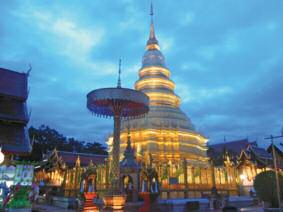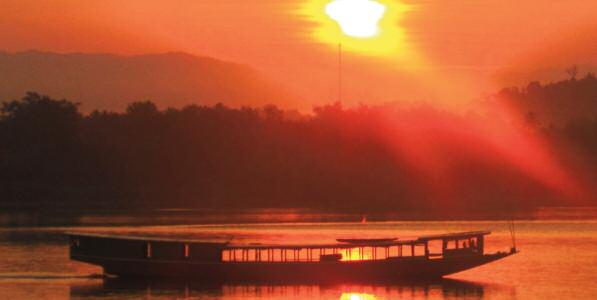Thailand is full of temptations – the northern city of Chaing Mai among them. When the chance to house-sit at a property for sale presented itself, we viewed the online photographs and agreed to spend several months holding the fort at a spacious home set in ten lush acres.
The traditional Thai house, built in expat foreigner style, looked just the ticket, although we did have a couple of reservations.
What if the house sold early?
What about the owner’s car, clocking in at almost 250,000 miles – how reliable would it be?
Our first trip to northern Thailand was more than 30 years ago, so it wasn’t just the car that had a few miles on the clock. What the heck, we’re always up for adventure, so we paid the visa fee, booked our flights, then hoped for the best.
Returning to the northern region after so many years was a bit of a shock. This once-quiet part of Thailand is now firmly on the tourist track and the sight of so many back-packers gathered outside tiny shops selling cheap t-shirts took us by surprise. However, the shock was shortlived and we quickly remembered why we were so keen on returning to this part of Thailand in the first place, for what this engaging country does best… culture. Having settled into our assignment we ventured beyond the local village, finding no shortage of festivals, markets and non-tourist hill-tribes all within easy reach of our base.
To our delight, the sight of elaborately decorated temples filled with friendly monks clad in saffron robes soon became more common than ‘I love Thailand’ t-shirts. Within the city limits, it was hard to avoid bumping into a member of Chiang Mai’s thriving expat community.

Lured by welcoming natives, a varied landscape, outdoor lifestyle and an agreeable climate for much of the year, it’s no surprise that this part of Thailand is attracting more and more international retirees. Expat communities are booming
and supermarkets catering to a global clientele are popping up all over, making western staples of imported Parma ham or smoked kippers from Waitrose easy to come by; we could even pick up decaf teabags in Marks and Spencer.
Expats around the globe are choosing a laid-back retirement in this part of the world and many more opt for long-term visits, spending several months of the year basking in sunshine beneath blue skies.
By UK standards purchasing property is cheap, although there are a few obstacles to overcome before signing on the dotted line. Rental choices are extensive and retirees are cottoning on to extend-stay apartments; with an array of quality amenities and service options, they offer a great solution to sun-seeking retirees with a taste for adventure.
Medical tourism in Thailand is a growth industry so health care and dental needs are well catered for; many North Americans find it cheaper to fly half-way around the world than stay at home for the same procedure. By western
standards, the cost of living in northern Thailand is cheap-as-chips, so it’s little surprise that so many baby-boomers and those in the 50-plus age group find northern Thailand not only agreeable, but affordable, too.
The first to arrange a viewing at our house-sit were Canadian expats; initially purchasing a small property when they moved to Chiang Mai several years ago, they now felt comfortable enough to put down deeper roots and upgrade to a larger home in the countryside. The fact that a coup d’état was taking place at the time of their visit made it doubtful that any transaction would be rushed through the notoriously slow Thai administration system, so there was every likelihood that we would reach the end of our assignment before the house passed on to a new expat owner.
As for our second concern – the aged are, which we affectionately nicknamed ‘Ole Blue’ – well, that was a different story. A couple of months into our trip the gentle blue car failed but, as breakdowns go, it turned out to be a good one.
Having travelled less than 12 miles to a stunning golden temple, beautifully decorated with colourful lanterns to mark a week-long festival, we enjoyed the hypnotic sound of monks chanting evening prayers.
Then we wandered down a street market selling everything from shoes and scarves to Krathongs – a coconut base decorated with banana leaves, holding a small arrangement of flowers, candles and incense. Lighting the candle and floating a Krathong down the river is said to bring good luck. The Loy Krathong festival takes place once a year to coincide with a full moon. We walked down to the river and floated a Krathong before returning to the car, but we didn’t get too far: heading out of the car park, the engine cut out and we came to an abrupt halt.
In this part of Thailand little English is spoken – but we quickly fathomed that garages had closed for the festival; requests for a taxi, bus or motorcycle drew a blank, and there was nothing other than a few rackety rickshaws with drivers who looked more mature than the car.
Northern Thais are renowned for their friendliness and we were relieved when three thirtysomethings stepped in to lend a hand. One of the group spoke passable English, so maybe floating a Krathong downriver had brought us luck after all. Within the hour a mechanic had given the car a roadside check and confirmed our thoughts: ‘Ole Blue’ was going nowhere, so we knocked on the door of a new hotel tucked off the main street and fell asleep hoping for good news the
following day.
The electronic box had conked out due to old age and finding a replacement part, the same age as the car, would require floating a whole raft of Krathongs. However, that didn’t deter us from orchestrating a search that led south to Bangkok and eventually into Australia where the car was manufactured. All ended well. We left the house in perfect order, ready for the next owner. ‘Ole Blue’ was back on the road and the absentee owners couldn’t thank us enough.
Our house-sitting adventure in Thailand left us wanting more, and at the end of the assignment we renewed our visa permit for the final time and set off, in a new, shiny white rental car, to spend a couple more months exploring some of
the lesser-known parts further north. House-sitting is a great way to live like a local in different corners of the world and a super way to try before you buy.

